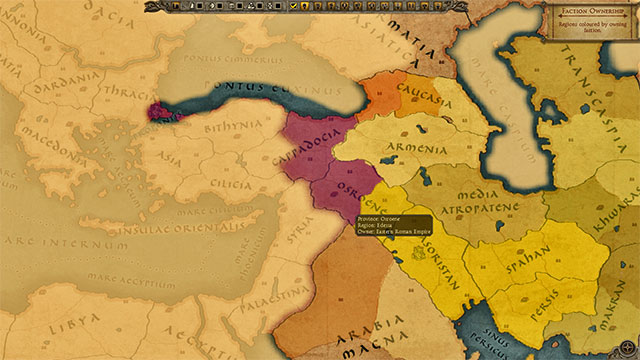Total War Attila: Campaign planning

The main trouble with campaign planning is setting its objective. You want to conquer enemy territory, raid them, loot border territories, find a place to settle in, or maybe convince an enemy to some diplomatic action, like signing peace treaty or accept your leadership? Each of those objectives mean fighting battles, but they differ in details and require using different forces.
Conquest depends on numbers. You need at least few armies, each with 20 formations and minimum one siege machine. Armies must cooperate with each other, fight battles and siege a city in pairs to reduce chances of failure. They must walk into enemy territory in a way that will daunt him from attacking and force him to defense. If a border between you and him is through three regions, leaving one of them at peace might encourage him to attack you. Your armies objective is first to destroy enemy armies and then claim him settlements. In conquered regions armies must regain strength, wait through winter and then move forward. The whole process must be repeated until you take over the last region. If a state has become a horde, then you must destroy remains of enemy forces. If enemy happened to be weaker than you expected, then some of armies should be left on cities to improve public order. Remember - you want to conquer enemy settlements. So try to limit burning and raiding. It will only increase costs of future rebuilding.
Raiding is similar, but instead of taking over regions your objective is to loot them. You can do it with the right stance or by taking over cities and taking away its money. Campaign difficulty depends on how much gold you need. You can attack only cities that are in direct neighbor with you, raid them and immediately return. You can also walk more deep into enemy territory, but you risk fighting forces gathered there. When playing as horde you don't have where to retreat, so you can as well just move forward, building camps and regaining strength on the way.
Desolation creates a no man lands between your country and enemy territories. It is a track of some Hordes march as well, like Huns. No man land is a barrier between two nations. Effective one, as it makes it harder to supply armies during winter and forces them for long marching outside your territory. Fighting with neighbor enemy is easy. You can easily replenish loses and fall back in case of failure. No man land makes retreat longer and regrouping harder. Additionally, resettlement of no man land is time and money consuming.
Settling in requires a target. It can be both a neighbor province or one on other side of continent. In that case war objective is to get to selected place. It forces two things. First - destroying enemy armies. There will be many of them, especially in case of large nations like Western Roman Empire, as a horde marching through their territories will encourage enemy to gather backup from other provinces. Destruction require replenishing formations and creating new ones, so once every few turns horde will have to make a camp. Such campaigns should be considered as a journey divided into phases. Armies get to first province, fight, rest, raid, move forward. In second province the process is repeated and so on until the target, where the horde settles. Second thing - money. Horde is expensive, especially if a chosen province is far away. Because of that some of settlements encountered must be raided, some even burned. Otherwise the horde will be weakened, first by the costs of maintaining army, and them by enemy armies.
Coercion is based on simple principle - enemy will be eager to accept your terms if he won't have means to defend himself. In that case campaign objective is to destroy enemy army and raid his largest cities. If one of enemy armies is lead by a king, it's even better. A power shift because of death of ruler should help you with your plans. Your armies should move close to each other, so that they could help each other in battle. Numbers should be your main advantage. You walk on enemy territory, destroy the closest army, raid a city and make a proposition. If it is refused, you repeat the process. It might happen that the tactic won't work and enemy will refuse to all your propositions. In that case you can either conquer him or retreat to your territory. In both cases you gain something, new territories or money, weakening enemy and discouraging him from attacking you.
No matter the tactic, every army should have a backup of another one, in best case as large. You should move in a way so that roads leading to your country are blocked. If enemy will want to attack, he will be forced to get through your armies or use longer, more dangerous routes through forests and swamps. You shouldn't march during winter, as then you will lose a part of every army. Because of that, when planning a campaign, consider first three turns - from spring to autumn - as a time for moving and fighting, and winter as a time for rest and regaining strength. March and attack during winter only when thanks to that you will conquer a city, where you will be able to rest. And don't be afraid to retreat, if a campaign won't go well for you. In that case it is better to try to sign peace, than unnecessarily bleed out the rest of your forces.
You are not permitted to copy any image, text or info from this page. This site is not associated with and/or endorsed by the developers and the publishers. All logos and images are copyrighted by their respective owners.
Copyright © 2000 - 2025 Webedia Polska SA for gamepressure.com, unofficial game guides, walkthroughs, secrets, game tips, maps & strategies for top games.
